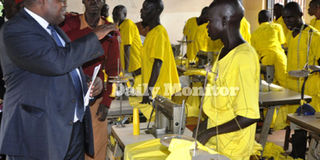Another chance of life while in prison

Principal Judge Dr Yorokamu Bamwine touring tailoring department of prisoners. Photo by Ephraim Kasozi
What you need to know:
- Many convicts enter prisons crying due to fear of the conditions behind the walls.
Little do they know that although they are sent for incarceration, there is hope beyond their sentences. - A 2014 report by the African Journal of Criminology and Justice indicates that Uganda has the best prisons rehabilitation programmes in Africa and ranks fourth globally, going by the re-offender rate.
- Human rights advocate Dr Livingstone Sewanyana says the report is largely true because prisons remain one of the most disciplined forces within the country. They view their mandate from human rights perspective emphasising rehabilitation of inmates as the ultimate goal.
Early this year, Joram Hannington Lusonzi qualified for Advanced Level education after scoring Aggregate 20 in the 2015 Uganda Certificate of Education (UCE) examinations.
Lusonzi, 25, a student of Upper Prison Inmates Secondary School, had dropped out of school in 2008 at Primary Seven but only resumed studies in 2012 when he was remanded over alleged aggravated defilement.
The jubilant Lusonzi revealed that he wants to join advanced level and pursue his dream of becoming a lawyer.
Lusonzi is among the hundreds of beneficiaries of the formal education as a form of rehabilitation at different prison units throughout the country.
Dennis Mujuni, an inmate and a pioneer head teacher of the school, described the performance as “excellent” despite the challenges of lack of facilitation and adequate materials for study.
Mujuni attributes the successful performance to the conducive environment by the prison authorities. “In this place, you have a lot of time to think about three things (past, present and future) and we encourage each other to transform.”
He says studying helps inmates to re-invent themselves as they serve their punishments.
“Conditions change and many of the inmates are first offenders so they should not be treated as criminals,” says a prison officer adding that the skills and knowledge help inmates to prepare their lives after prisons.
Frank Baine, the Prisons spokesperson says, other inmates undergo non formal education also known as functional adult literacy, vocational training like tailoring, crafts, carpentry, bricklaying, computer, metal fabrication, religious empowerment, enforcement of strict discipline and counselling.
Findings
A 2014 report by the African Journal of Criminology and Justice indicates that Uganda has the best prisons rehabilitation programmes in Africa and ranks fourth globally, going by the re-offender rate.
Re-offending refers to the number of times the same person is jailed in a year.
The report suggests that in Uganda, out of every 100 inmates released, only 32 would be back in prison within a year. In Africa, Uganda is followed by Zambia at 33 per cent, Rwanda 36 per cent and Kenya and Tanzania at 47 per cent.
However, Baine says the rate of re-offending has since reduced to 29 per cent with robbery, theft and defilement forming the common offences among re-offenders.
“Majority of re-offenders are habitual offenders and because of the short terms they spend in prison, they cannot go through the whole process of rehabilitation. There is no effective programme to change a person’s behaviour who, for instance, is sentenced to four and six months,” says Baine.
He quickly adds that the ex-inmates, even when they get skills, they lack the empowerment, which compels them to go back to their criminal tendencies.
“For a robber, even if they have a certificate, they are feared in society because of their criminal record. They are not simple people to be employed. But also consider the environment where people caught in conflict with the law come from places such as streets and return there after prison,” he says.
Baine says there is stigmatisation of ex-convicts in communities where everybody thinks they are still the same. “Even police sometimes are biased because during their hunt for suspects they start with those with criminal records to trace culprits.”
Human rights advocate Dr Livingstone Sewanyana says the report is largely true because prisons remain one of the most disciplined forces within the country. They view their mandate from human rights perspective emphasising rehabilitation of inmates as the ultimate goal.
“This achievement can be attributed to several factors such as the open door policy they (prisons) adopted and have over the years allowed independent inspection of prisons by independent bodies thereby deterring possible abuses of prisoners’ rights,” says Dr Sewanyana who is also also the executive director of the Foundation for Human Rights Initiative.
Take from stakeholders
He commends the Uganda Prisons for cooperating in implementing the national paralegal advisory services under which the paralegals have been able to enhance awareness of the rights of inmates and prison warders.
“…The establishment of human rights committees in the Uganda Prisons Services has also helped in the enforcing of human rights standards against the errant officers,” says Dr Sewanyana adding that prison authorities can do better if the problem of overcrowding is as well as the perennial under funding of the prison activities is addressed.
He suggests the need to invest more in rehabilitation programmes like prison industries thereby enabling inmates to acquire skills which would go a long way in reducing the rate of re-offending.
“We need to take a multi-pronged approach. The public need to understand the essence of imprisonment and punishment and to abide by the law in their action. Of course, that way would diminish chances of lynching of ex-prisoners,” says Dr Sewanyana.
There is need to realise and address many factors contributing to re-offending such as extreme poverty, unemployment and domestic violence, among others.
“These (factors) need to be dealt with to create an enabling environment for re-integration of ex-convicts,” he adds.
rehabilitation services in prisons
Learning. Formal education comprising primary, secondary and tertiary studies
Practicals. Vocational studies where inmates undergo carpentry and joinery, computer studies, farming and agriculture, bible and other religious studies.
Talent. Music, dance and drama
Skilled labour. Work where prisoners provide non-skilled, semi-skilled and skilled labour in the various departments. Prison officers say prisoners are paid from Shs100 to Shs500 in line with the statutory instrument.
Arts. Prisoners make handcrafts which are sold out on their behalf to provide a source of income.
The numbers
4,400
The registered increase of inmates since last year.
48,689
The current prisoner population in the country. In 2015, it was reported to be 44,289.
1:6
The current ratio of staff to prisoners against the ideal 1:3. There are 40,024 vacancies existing in prison services.
249
The number of prison units countrywide.




